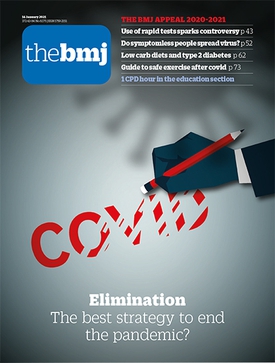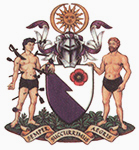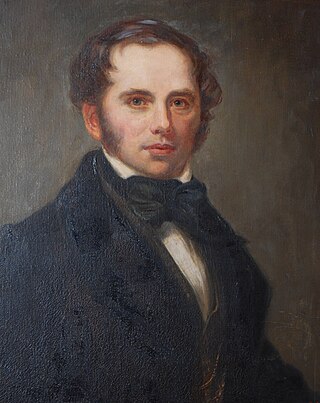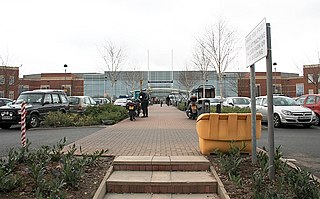Related Research Articles

The Royal College of Surgeons of England is an independent professional body and registered charity that promotes and advances standards of surgical care for patients, and regulates surgery and dentistry in England and Wales. The college is located at Lincoln's Inn Fields in London. It publishes multiple medical journals including the Annals of the Royal College of Surgeons of England, the Faculty Dental Journal, and the Bulletin of the Royal College of Surgeons of England.

The BMJ is a weekly peer-reviewed medical journal, published by BMJ Group, which in turn is wholly-owned by the British Medical Association (BMA). The BMJ has editorial freedom from the BMA. It is one of the world's oldest general medical journals. Previously called the British Medical Journal, the title was officially shortened to BMJ in 1988, and then changed to The BMJ in 2014. The journal is published by BMJ Publishing Group Ltd, a subsidiary of the British Medical Association (BMA). The current editor-in-chief of The BMJ is Kamran Abbasi, who was appointed in January 2022.
The British Medical Association (BMA) is a registered trade union for doctors in the United Kingdom. It does not regulate or certify doctors, a responsibility which lies with the General Medical Council. The BMA has a range of representative and scientific committees and is recognised by National Health Service (NHS) employers alongside the Hospital Consultants and Specialists Association as one of two national contract negotiators for doctors.

The Australian Medical Association (AMA) is an Australian public company by guarantee formed as a professional association for Australian doctors and medical students. The association is not run by the Australian Government and does not regulate or certify doctors, a responsibility which lies with the Medical Board of Australia and the Australian Health Practitioner Regulation Agency. The association's national headquarters are located in Barton, Australian Capital Territory, in addition to the offices of its branches in each of the states and territories in Australia.

John Conolly was an English psychiatrist. He published the volume Indications of Insanity in 1830. In 1839, he was appointed resident physician to the Middlesex County Asylum where he introduced the principle of non-restraint into the treatment of the insane, which led to non-restraint became accepted practice throughout England. With colleagues he founded the 'Provincial Medical and Surgical Association', and founded the 'British and Foreign Medical Review, or, A Quarterly Journal of Practical Medicine'.
In the United Kingdom, junior doctors are qualified medical practitioners working whilst engaged in postgraduate training. The period of being a junior doctor starts when they qualify as a medical practitioner following graduation with a Bachelor of Medicine, Bachelor of Surgery degree and start the UK Foundation Programme, it culminates in a post as a consultant, a general practitioner (GP), or some other non-training post, such as a specialty doctor or associate specialist post.

The Royal College of Emergency Medicine (RCEM) is an independent professional association of emergency physicians in the United Kingdom which sets standards of training and administers examinations for emergency medicine. The patron is The Princess Royal.

The Royal College of General Practitioners (RCGP) is the professional body for general (medical) practitioners in the United Kingdom. The RCGP represents and supports GPs on key issues including licensing, education, training, research and clinical standards. It is the largest of the medical royal colleges, with over 54,000 members. The RCGP was founded in 1952 in London, England and is a registered charity. Its motto is Cum Scientia Caritas – "Compassion [empowered] with Knowledge."
The Public Monuments and Sculpture Association (PMSA) was an organisation established in 1991 to bring together individuals and organisations with an interest in British public sculptures and monuments, their production, preservation and history. It was wound up in the summer of 2020, although members dissatisfied with this decision established a successor organisation with similar objectives, the Public Statues and Sculpture Association, in the autumn of the same year.
The British Thoracic Society (BTS) was formed in 1982 by the amalgamation of the British Thoracic Association and the Thoracic Society. It is a registered charity and a company limited by guarantee.

Sir Charles Hastings was a medical surgeon and a founder of the British Medical Association, the BMA, on 19 July 1832.
Doctors in Unite is a trade union for doctors in the United Kingdom. It was formerly known as the Medical Practitioners' Union (MPU) before its affiliation with Unite.

Eustace Chesser was a Scottish psychiatrist, social reformer and writer.

Raanan Evelyn Zvi Gillon FRCP is emeritus professor of medical ethics at Imperial College London, and past president of the British Medical Association.

Charles Frederick William Illingworth was a British surgeon who specialised in gastroenterology. Along with a range of teaching and research interests, he wrote several surgical textbooks, and played a leading role in university and medical administration.

Sir Terence Alexander Hawthorne English is a South African-born British retired cardiac surgeon. He was Consultant Cardiothoracic Surgeon, Papworth Hospital and Addenbrooke's Hospital, Cambridge, 1973–1995. After starting a career in mining engineering, English switched to medicine and went on to lead the team that performed Britain's first successful heart transplant in August 1979 at Papworth, and soon established it as one of Europe's leading heart–lung transplant programmes.

The Royal College of Ophthalmologists, founded in 1988, is an independent professional body and one of the Medical Royal Colleges. They set the standards and examinations for medical doctors aiming to become ophthalmologists, and provide surgical skills training, as well as services to those who have completed their training.

The Worcestershire Royal Hospital is an acute general hospital located in Charles Hastings Way in Worcester, England. It is managed by the Worcestershire Acute Hospitals NHS Trust. The hospital replaced the Worcester Royal Infirmary in 2002 as the main hospital in the county of Worcestershire.
Robert James Nicholl Streeten was a British physician and medical editor and secretary of the Provincial Medical and Surgical Association.
William Harcourt Ranking was an English physician, medical editor, and photographer.
References
- ↑ "BMA - An outline history of the BMA". British Medical Archive. 9 July 2007. Archived from the original on 9 July 2007. Retrieved 16 March 2020.
- ↑ "BMA - The history of the BMA". bma.org.uk. British Medical Association. Retrieved 16 March 2020.
- ↑ "Provincial Medical and Surgical Journal". Provincial Medical and Surgical Journal. J. Churchill (Wednesday 3 April 1844). 1844.
- ↑ "Archive of "Provincial Medical and Surgical Journal"". www.ncbi.nlm.nih.gov. US National Library of Medicine National Institutes of Health. Retrieved 16 March 2020.